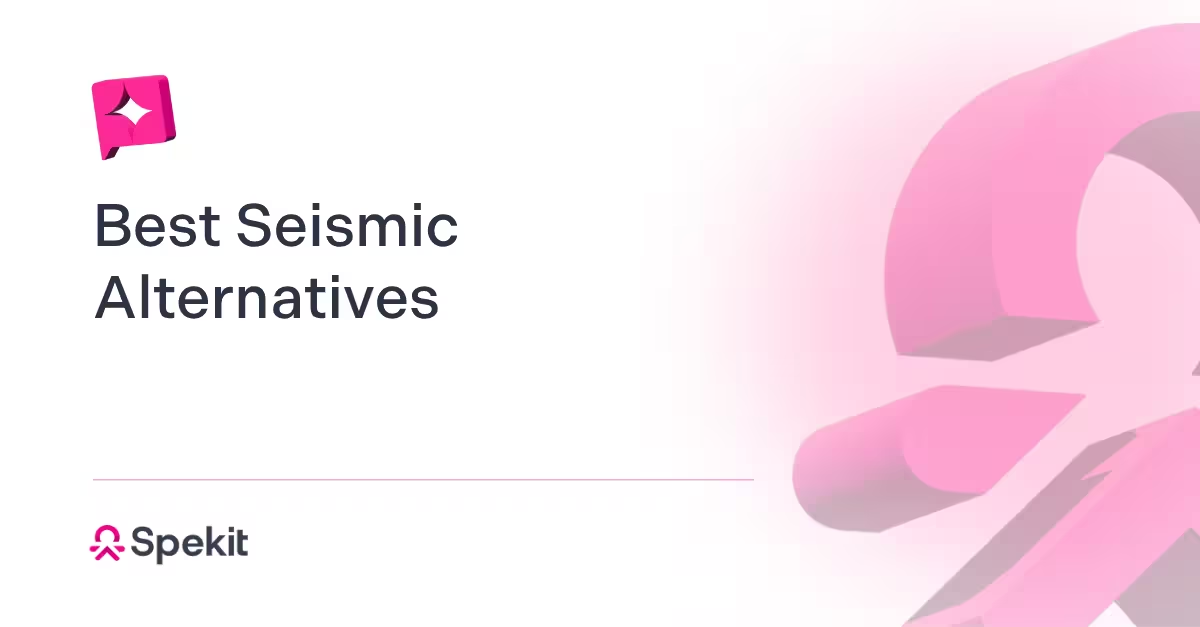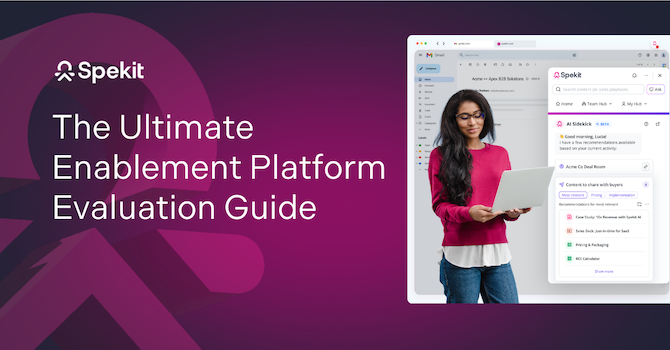While many users value its breadth, others find Seismic’s interface clunky and complain that finding the right information is a chore.
Case in point:

For many teams, the price tag (over $100,000 a year), the lengthy setup, and the ongoing management process can make Seismic feel out of reach.
If you’re experiencing the same challenges (or exploring the market for the first time), we’ve compiled the best Seismic alternatives for 2025. From affordable platforms for small teams to enterprise-ready ecosystems, this list covers a range of options to match different budgets, needs, and team setups.
They are:
- Spekit - A modern approach to sales enablement software
- Highspot - Sales enablement for large, fast-moving teams
- Mindtickle - AI-powered sales readiness for high-performing teams
- Showpad - Live visual selling for sales teams that sell physical products
- Bigtincan - On-the-go training and content for customer-facing teams
- Allego - Sales enablement for hybrid sales teams
- WorkRamp - LMS-style enablement for sales teams
- GTMBuddy - AI-powered deal prep and content delivery
- Dock - Digital sales rooms for faster, smoother deal cycles
- Trainual - Process documentation and onboarding at scale
- SalesHood - AI-powered enablement for faster, repeatable revenue
- Paperflite - Lightweight, AI-powered sales content management
- Continu - Personalized training for teams and customers
- Content Camel - Centralized sales & marketing content at your team’s fingertips
Compare Seismic alternatives
Here’s a quick look at the best Seismic alternatives, who they fit, and what makes them stand out:
1. Spekit — A modern approach to sales enablement software
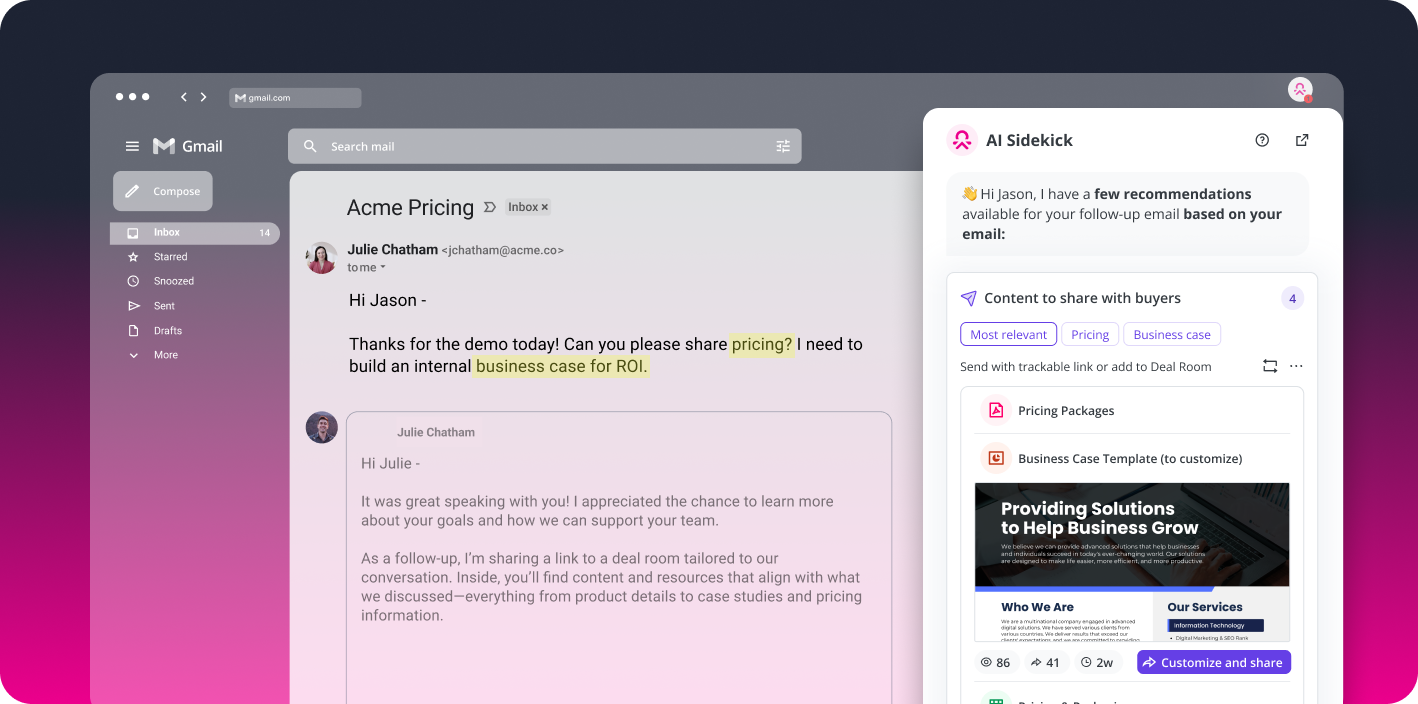
Spekit is a modern sales enablement platform that unifies sales content and learning, and enables your reps in their flow of work with AI Sidekick, the most contextual Just-in-Time Sales Assistant™.
In a nutshell, Spekit gives you both:
- A centralized content management system for organizing and maintaining all your sales and enablement materials, integrating with all your existing tools.
- An AI Sidekick (think intelligent Chrome Extension) that delivers the most relevant sales content and coaching to reps when they need it, so they’ll always know what to send or say to move deals along faster (we call this just-in-time enablement™)
Like Seismic, Spekit includes the traditional pillars of a sales enablement platform, including:
- Content Management System (CMS): A centralized library for sales content (e.g., decks, playbooks, talk tracks, and battlecards) that keeps every asset version-controlled, searchable, and instantly available across tools like Salesforce and Slack.
- Training and assessments: Built-in tools for delivering quizzes and microlearning that reinforce learning in short, digestible bursts, helping reps retain key information without leaving their workflow.
- Advanced analytics: Real-time insights that show how content is used, which training materials are driving results, and where reps may need additional coaching or support.
Unlike Seismic, Spekit is designed around how sales teams work today, seamlessly connecting into their daily workflows to deliver the right playbooks, case studies, process guidance, coaching, and more without taking them away from wherever they’re selling.

Unique features in the Spekit platform:
- AI Sidekick: A proactive, always-on assistant that understands deal stage, persona, CRM context, email content, and call transcripts to recommend the right collateral, messaging support, answers, and tailored coaching, within the flow of work—no searching required.
By enabling them in the flow of work™, AI Sidekick helps reps effortlessly prepare for calls, follow-up, or create tailored deal rooms and buyer experiences—leading to faster deal execution, stronger buyer relationships, and reduced ramp times. Sidekick learns from usage over time, driving higher adoption and faster execution than portal-based tools.
- Deal Rooms: Spekit’s deal rooms let sellers dynamically share deal-related content, like case studies, one-pagers, and mutual action plans, directly with buyers. Instead of chasing links or attachments, buyers get everything they need in one easy-to-access space.
- Governance Dashboard: Spekit automatically detects duplicate entries, outdated materials, and content gaps, helping you maintain a clean, consistent, and reliable CMS without manual effort.
- Playlists: With Playlists, teams can build dynamic, guided learning paths for various enablement needs, like onboarding or product launches. Unlike static folders, Playlists sequence relevant assets in a flexible way that adapts to how reps actually learn and work.
- Revenue Insights: Spekit provides detailed analytics on content consumption and buyer engagement, showing which sales assets are most effective at moving deals forward. This helps users connect enablement efforts to real business outcomes, like higher win rates, faster ramp times, and shorter sales cycles.
- Microlearning with Knowledge Checks: Short, simple assessments to track your team’s comprehension and reinforce what matters without pulling reps out of work. Knowledge sticks, behaviors change, and ramp accelerates.
- Spotlights: Targeted, in-app alerts for launches, competitive updates, and time-sensitive changes. Communicate, reinforce, and measure adoption in one motion.
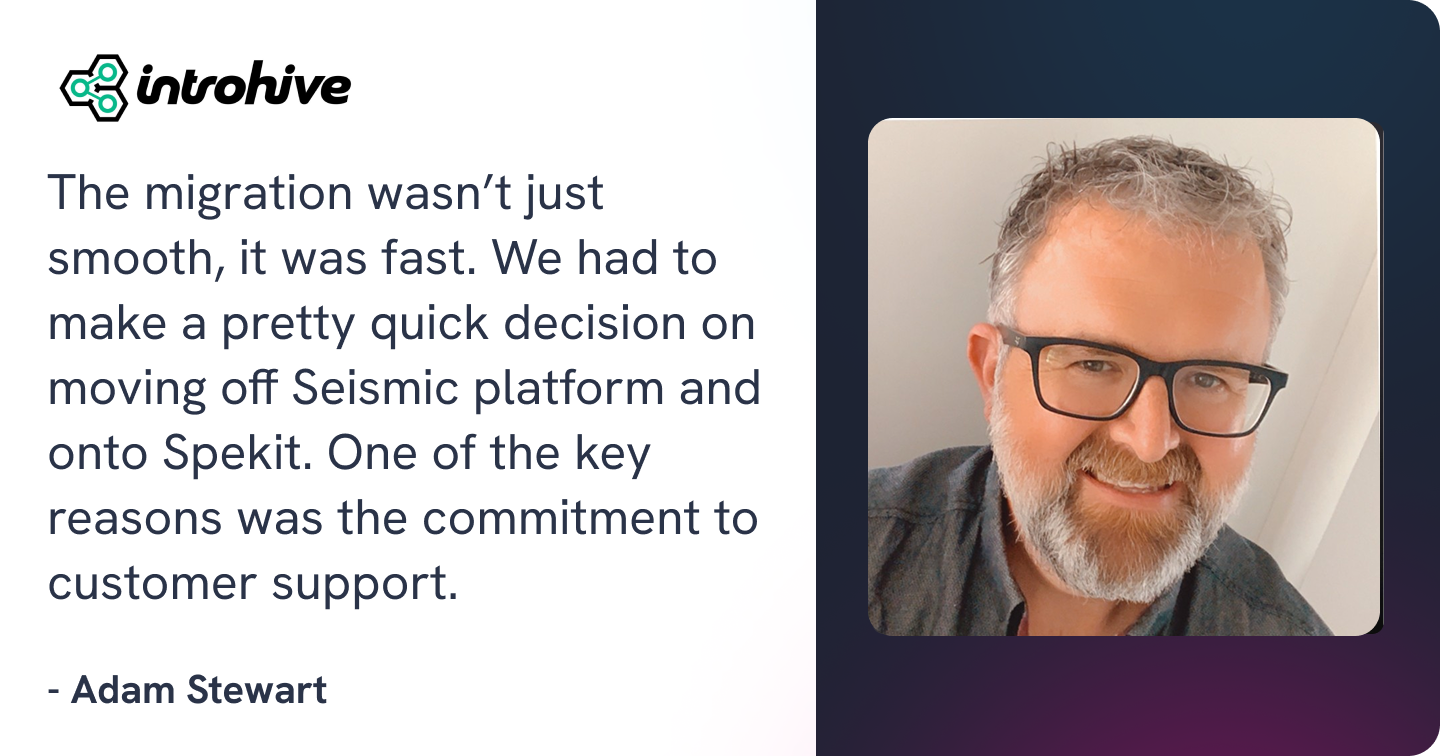
Caption: See how Introhive ramps 75% faster after ditching Seismic for Spekit
With Spekit, enablement content becomes more accessible and actionable because it meets sellers where work happens. Spekit’s just-in-time, AI-powered guidance delivers the right knowledge in context, helping reps apply what they learn and close deals faster.
Why Spekit is a good Seismic alternative
Spekit was designed to solve the same high-level challenge as Seismic, but instead of acting as another static repository, Spekit uses AI to sync and govern content, then proactively surface enablement in the flow of work. That means the right message, playbook, or battlecard finds your reps exactly when and where they need it, with no searching required.
Where Seismic can feel heavy, complex, and siloed, Spekit is built for teams that need something lighter, faster, and more intuitive. Spekit AI Sidekick continuously learns from CRM activity, call transcripts, and deal context to recommend the next-best content or coaching in real time. This proactive, personalized guidance eliminates the adoption struggles and content decay that push many teams off Seismic.
Spekit’s CMS also delivers a more intuitive, contextual user experience. Updates are instant — edit once, and every touchpoint refreshes automatically — so reps never risk sending outdated collateral. Spekit AI automatically scans all content and contextually recommends the right assets to reps, reducing the need to search altogether. This makes finding information faster and easier, which is a major advantage over Seismic’s slower, search-heavy experience.
Customers switching from Seismic to Spekit have reported 70% faster onboarding, dramatic time savings from reduced content searches, and measurable gains in adoption and rep productivity.
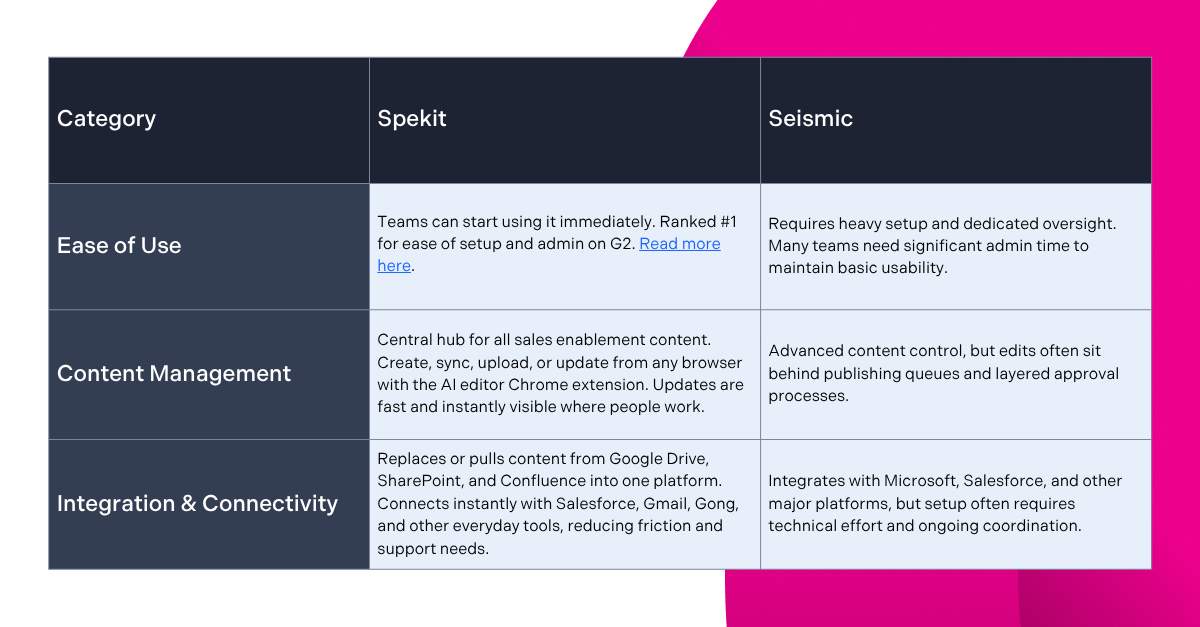
Who is Spekit built for?
Spekit is best suited to mid to enterprise-level companies, with sales enablement and marketing teams seeking to solve the problem of ineffective enablement and inefficient sales teams.
Spekit is for those seeking to:
- Spend more time selling, not searching: Cut the time wasted hunting for content so reps and managers can focus on what matters: engaging buyers and closing deals.
- Reduce rep ramp time: Spend less time training, enable more self-sufficiency, and drive faster quota attainment.
- Speed up change adoption: Create more GTM agility, more accountability, better process adherence, and data.
- Prove enablement ROI: Connect enablement activities to business outcomes with data that shows which sales content and guidance actually move deals forward.
- Implement everboarding: Ensure training is continuous and coaching is embedded into the flow of work to effectively drive sales velocity.
- Align Sales and Marketing: Centralize knowledge, unify content and collateral, and drive cross-functional alignment.
"Our vision has always been to deliver a personalized enablement assistant that empowers reps with the guidance, knowledge, and content they need, exactly when they need it. Spekit AI is a critical step in that journey, not just a feature, but a paradigm shift that removes the friction and frustration reps face with traditional tools. It's part of our commitment to redefining enablement so reps can focus on what truly matters: closing deals and driving growth."
— Spekit CEO & Co-founder Melanie Fellay
2. Highspot — Sales enablement for large, fast-moving teams

Highspot is a sales enablement platform that brings together sales content, training, coaching, and buyer engagement in one place. Because of this, reps can quickly find what they need, learn how to use it, and stay focused on selling rather than digging through folders or switching between tools.
For enablement leaders, Highspot is a central hub to manage content, build learning paths, and deliver coaching backed by real sales call insights. The platform also recommends the right assets based on CRM data and deal stage, so reps are armed with the best content right when they need it.
Key features in the Highspot platform:
- Centralized content hub – Bring sales and marketing materials into one searchable place, so reps can always find approved content for every deal stage.
- Smart content recommendations – Suggests the most relevant materials based on deal stage, buyer profile, or CRM activity.
- AI-powered coaching – Analyzes sales calls for tone, talk-time, and keywords, surfacing skill gaps and delivering personalized coaching at scale.
- Integrated learning paths – Onboard and upskill reps with structured programs that combine courses, exercises, and just-in-time support.
- Digital Sales Rooms – Create polished, branded spaces where reps share content and collaborate with buyers across the deal process.
- Content performance tracking – Shows how content is used and what drives engagement, so you can double down on what works.
Why Highspot is a good Seismic alternative
Seismic is powerful, but it often comes with a steep learning curve for both admins and reps. Highspot takes a more intuitive approach. The interface is cleaner, search is faster, and recommended content is easier to access without digging. For teams that need enterprise-level features without the overhead of a rigid, complex platform, Highspot offers a simpler path to adoption.
Highspot is best for:
Large sales teams (especially in tech, finance, or enterprise SaaS) that need structured training and CRM-integrated content delivery.
Standout feature - AutoDocs
AutoDocs helps reps generate polished, personalized sales materials fast. Instead of building decks or proposals from scratch, reps fill out a simple form, and AutoDocs pulls in the right content, charts, and messaging based on CRM data, buyer persona, and product line.
This saves time, reduces formatting mistakes, and keeps everything on-brand. Reps spend less time editing slides and more time selling, while still delivering professional, tailored assets that speak directly to the buyer’s needs.
3. Mindtickle — AI-powered sales readiness for high-performing teams

Mindtickle is a sales readiness platform that helps companies close skill gaps, ramp reps faster, and drive consistent revenue performance.
With Mindtickle, sales reps can work through personalized learning paths, engage in realistic roleplays, and get instant AI-generated feedback on their performance. Managers get visibility into rep progress and can assign training based on real data.
Key features in the Mindtickle platform:
- AI Roleplays – Reps can practice selling in realistic scenarios and get instant feedback, so they can sharpen messaging before meeting prospects.
- AI Copilot – Handles meeting prep, summarizes calls, answers questions, finds content, and drafts follow-ups, freeing reps to focus on selling.
- Sales content management – Organize and surface the right content based on deal stage or buyer questions, with visibility into what gets used.
- Digital Sales Rooms – Provide buyers a single, organized space to view content, leave feedback, and stay aligned, so deals progress faster.
- Conversation intelligence – Analyze sales calls to reveal talk patterns, skill gaps, and follow-up actions, and then connect those insights to coaching.
Why Mindtickle is a good Seismic alternative
Seismic can be difficult to navigate, especially for new users. Mindtickle, by contrast, is more structured out of the box, with pre-built onboarding templates, customizable training paths, and built-in assessments that make it easier to get value right away.
Unlike Seismic, Mindtickle doesn’t stop at sales enablement. It also offers content creation and strategy services to help marketing teams build the right assets and align them to how sellers work and what buyers need.
Mindtickle is best for:
Mid-to-large organizations prioritizing rep performance, data-backed coaching, and certifications.
Standout feature - Readiness Index™
Mindtickle’s Readiness Index is a proprietary scoring system that identifies the skills, behaviors, and competencies of top-performing sellers and then measures every rep against that gold standard. The Index pulls in data from assessments, training completions, call analytics, and simulations to generate a dynamic readiness score for each rep.
So, instead of guessing where a rep needs help, you get a clear picture of who’s falling behind, what they’re missing, and how that gap is affecting revenue outcomes. You can then create/assign personalized coaching, reinforce specific skills, and track improvement over time, all within the same platform.
4. Showpad — Live visual selling for sales teams that sell physical products

Showpad enablement operating system (or Showpad eOS®) is an all-in-one AI solution that helps reps find the right sales materials fast, personalize what they share, and deliver more compelling conversations, whether they’re on a video call or meeting buyers face-to-face.
Behind the scenes, Showpad gives sellers contextual content recommendations, interactive presentation tools, and a sleek way to collaborate with buyers through digital sales rooms.
Team leads can also build onboarding paths, assign training modules, and use coaching tools to replicate the habits of top performers.
Unique features in the Showpad platform:
- Showpad AI – Surfaces AI-powered answers and content suggestions, so reps spend less time searching and more time closing deals.
- Showpad Content – A centralized library where reps can find, customize, and share sales content, with built-in version control and instant updates.
- Showpad Shared Spaces – Secure deal rooms where reps and buyers collaborate, exchange feedback, schedule meetings, and align on next steps.
- Showpad Coach – Lets managers build structured training programs that blend interactive courses with real-world assignments for reps.
Why Showpad is a good Seismic alternative
Both Showpad and Seismic offer all-in-one enablement platforms, but Showpad makes it easier to start small. Instead of requiring a full suite rollout, Showpad lets teams purchase and implement individual products on their own, like content management or coaching.
That flexibility is ideal for smaller teams, limited budgets, or companies just starting to explore sales enablement. It gives you room to scale at your own pace, without overcommitting or overwhelming your reps.
Showpad is best for:
Sales teams that need to demo physical products and coach reps without complicating their tech stack.
Standout feature - Showpad Share
Showpad Share lets reps bring physical products to life through interactive 3D models, immersive 360° virtual showrooms, and personalized Shareable Pages. It’s especially useful for in-person selling, whether that’s at a tradeshow, during a field visit, or across the table from a buyer.
Instead of using static slides, reps can walk buyers through product demos in real-time, making complex features easier to explain and remember. It also helps buyers see how the product fits into their world, which speeds up understanding and builds trust.
Note: At the time of writing, it has been announced that Showpad will be merging with Bigtincan. This means that the features and capabilities of this platform might change, but at the time of publishing, the details of this section are accurate. You can learn more about the merger here. And you can read about Bigtincan below.
5. Bigtincan — On-the-go training and content for customer-facing teams
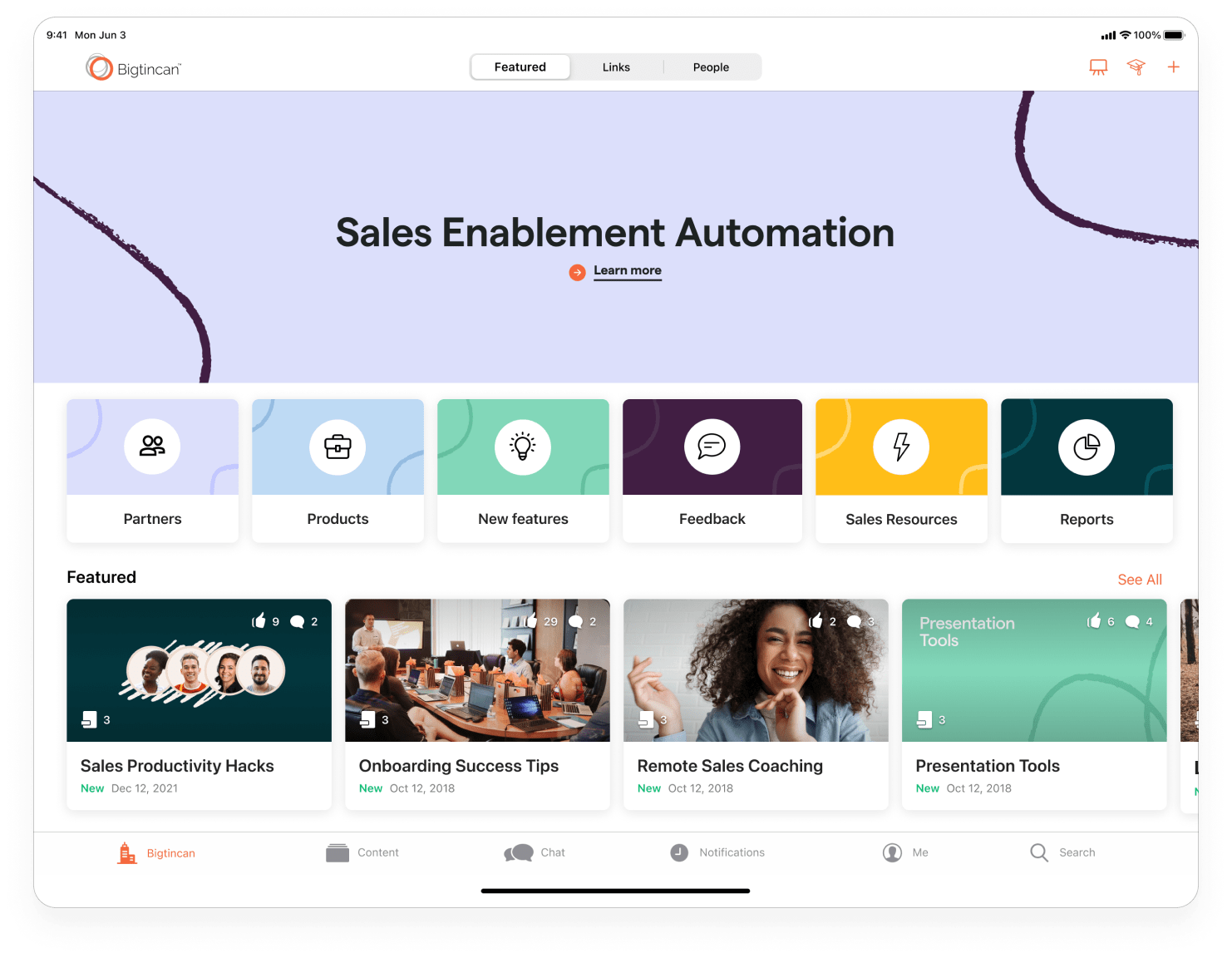
Bigtincan is purpose-built for reps on the move, especially in retail, field sales, or franchise environments where every buyer interaction needs to be fast, informed, and consistent.
From bite-sized mobile training to real-time content access and interactive coaching tools, Bigtincan equips reps to learn, engage, and sell directly in the flow of their daily work.
With this platform, reps can practice conversations with AI-powered simulations, get quick answers to questions through the in-app Genie Assistant, and stay updated with a built-in social feed.
Key features in the Bigtincan platform:
- GenieAI – A smart assistant that responds to reps’ questions, analyzes sales data, drafts content, and suggests next steps.
- RolePlayAI – Reps can sharpen their skills by practicing realistic buying conversations through AI-simulated scenarios.
- AuthoringAI – Automatically enhance training materials with natural voiceovers, translated captions, and audio.
- CoachingAI – Offers AI-driven feedback on speaking style, clarity, and pacing to help reps improve their pitch delivery and confidence.
Why Bigtincan is a good Seismic alternative
Seismic is best suited for enterprise sales teams who spend most of their time at a desk, working from CRMs and email. Bigtincan, on the other hand, is built with frontline and field sales in mind: retail associates, reps in the field, and customer-facing staff who are always on the move.
Instead of forcing sellers to adapt to a desktop-heavy workflow, Bigtincan delivers training, content, and real-time guidance directly in the mobile app reps already use on the job.
Bigtincan is best for:
Customer-facing teams in retail, field sales, or service environments that need flexible, mobile-first tools and personalized training.
Standout feature - Bigtincan SDK
Bigtincan’s Software Development Kit (SDK) gives teams full control to customize the platform’s design, layout, and workflows.
Whether it’s adapting sales flows, creating industry-specific sales rooms, or aligning the UI to your brand, the SDK ensures the platform fits your business—not the other way around.
Note: At the time of writing, it has been announced that Bigtincan will be merging with Showpad. This means that the features and capabilities of this platform might be integrated into the Showpad tool, but at the time of publishing the details of this section are accurate.
6. Allego — Sales enablement for hybrid sales teams

Allego helps hybrid sales teams learn and stay connected through asynchronous video, AI-powered coaching, and mobile-friendly training tools that fit into their day.
Reps can record practice pitches, review sales calls, share quick video updates with teammates, or get certified, all on their own time. By making learning and communication asynchronous, Allego keeps teams aligned, even when they’re distributed.
Key features in the Allego platform:
- Practical AI agents – Built-in AI “Sparks” guide reps with real-time suggestions, content prompts, and training recommendations in the flow of work.
- Sales content management – Keep sales content organized, accessible, and always up to date, with insights into what’s being used, shared, and driving buyer engagement.
- Digital Sales Rooms – Share curated content, video messages, and mutual action plans (MAPs) in one place to keep buyers engaged and deals on track.
- Conversation intelligence – Review sales calls with automatic transcription in 99+ languages to spot winning moments and areas for improvement.
- Video-driven coaching – Deliver feedback, reinforce skills, and certify reps using video-based practice and review.
- Mobile accessibility – Give reps full access to training, content, and coaching through a mobile app, wherever they work.
Why Allego is a good Seismic alternative
Unlike Seismic, which facilitates synchronous training formats, Allego is built for flexibility.
Its modular tools are easier to adopt, and its emphasis on video, mobile access, and asynchronous feedback makes it ideal for hybrid teams spread across locations and time zones.
Allego is best for:
Hybrid sales teams working across time zones.
Standout feature - Asynchronous Video Communication
Allego makes collaboration easier by allowing reps, managers, and subject matter experts to exchange feedback and updates through recorded videos. Reps can practice pitches, get certified, and share insights without needing to be in the same room, or even the same time zone.
It’s a powerful way to scale coaching, reinforce messaging, and keep hybrid teams aligned without slowing down the sales process.
7. WorkRamp — LMS-style enablement for sales teams
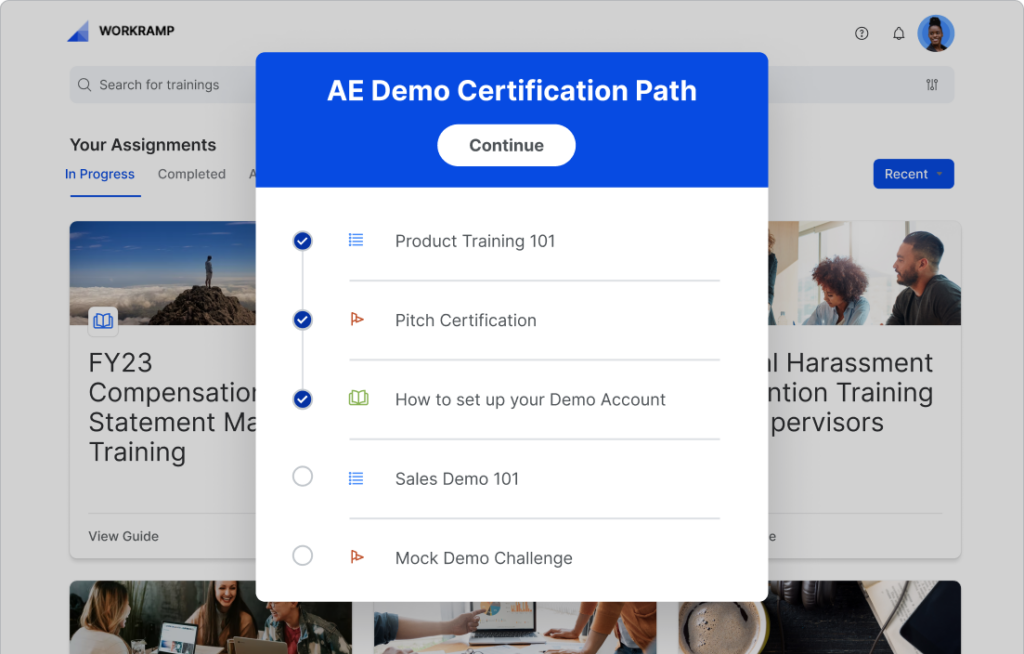
WorkRamp is a learning management system (LMS) that helps you build, manage, and scale online courses. It’s designed for teams that need formal, trackable programs for onboarding, pitch practice, and product training.
You can create custom courses with built-in authoring tools, embed AI-powered roleplay scenarios, and give reps on-demand access to key resources through a centralized CMS.
Everything is housed in one platform, so enablement teams can roll out consistent training, monitor progress, and connect learning directly to sales results.
Key features in the WorkRamp platform:
- AI Assist – Speed up content creation with built-in AI tools for drafting, editing, generating images, and captioning videos.
- AI Practice – Let reps build confidence through interactive roleplay bots that simulate real buyer scenarios.
- WorkRamp CMS – Organize learning and enablement content in a single hub, so reps always have the latest resources ready to use or share.
- Content authoring tools – Create engaging online courses using WorkRamp’s drag-and-drop editor, templates, and collaborative features.
- Advanced reporting and visualizations – Track sales rep performance with built-in dashboards and data visualizations.
Why WorkRamp is a good Seismic alternative
While Seismic is built primarily for sales enablement, WorkRamp goes further. It’s a full-featured LMS with built-in AI tools and a native CMS, so you can design complete training programs from the ground up. Whether you’re building a single course or a full certification path, WorkRamp lets you customize the structure, format, and flow to match your team’s needs.
You’re not limited to sales training either. WorkRamp supports everything from employee onboarding and talent development to compliance training and revenue enablement, making it a better fit for teams that want one system to handle all learning across the business.
WorkRamp is best for:
Teams that need an LMS designed to train reps, track progress, and improve performance.
Standout feature - Prebuilt content library
WorkRamp offers thousands of prebuilt courses across multiple verticals, including sales, so teams can roll out training without building everything from scratch.
New hires ramp up faster with structured learning paths, while experienced sellers can sharpen their skills and keep up with industry best practices.
8. GTMBuddy — AI-powered deal prep and content delivery
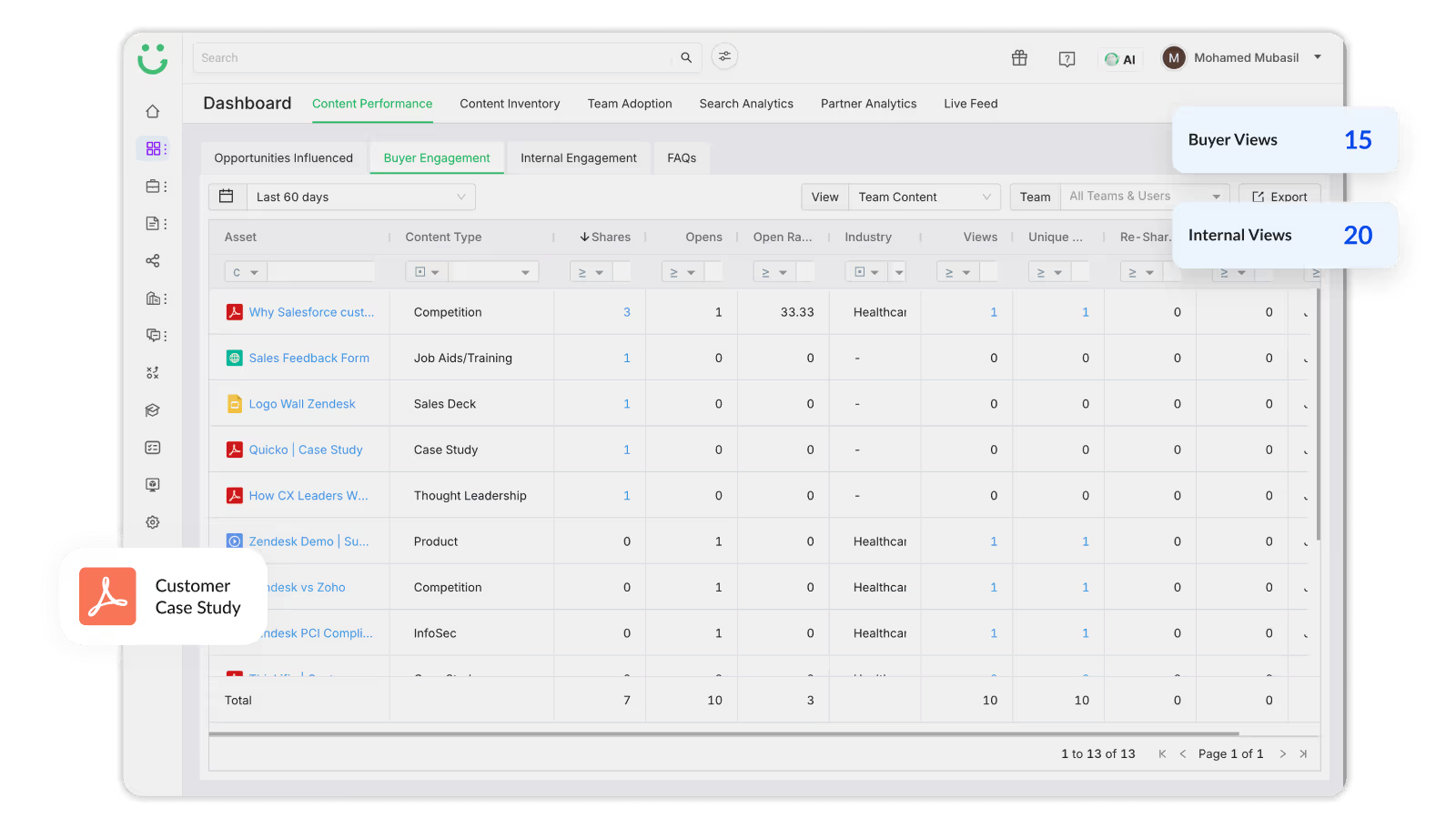
GTM Buddy is an AI-native revenue enablement platform that delivers content, training, and deal support right in the flow of work.
This platform uses AI to surface the sales materials that reps need based on deal context, CRM data, calendar invites, and previous interactions. It also proactively prepares reps for calls with objection-handling resources and persona insights.
This helps reps stay informed and confident during calls.
Key features in the GTM Buddy platform:
- Ask Buddy – An AI copilot that delivers instant answers, smart content suggestions, and context-aware insights to help reps close deals faster.
- AI RolePlays – Personalized practice scenarios that simulate real sales challenges, with instant AI feedback.
- Content intelligence (CMS) – A smart content system that organizes, recommends, and tracks content performance in real time, so sellers always have the most relevant materials at hand.
- AI LMS – A sales-specific LMS that links training directly to performance metrics, helping reps complete lessons and apply what they learn.
- Digital Sales Rooms – AI-guided sales microsites that surface the right content and signals for buyers while helping reps guide deals forward.
Why GTM Buddy is a good Seismic alternative
Seismic gives sellers access to sales plays, but it delivers content in a centralized location rather than directly within reps’ workflows. GTM Buddy takes a more dynamic route by surfacing bite-sized, deal-specific plays directly in reps’ workflows, along with the right assets and talk tracks based on deal context.
And after meetings, GTM Buddy uses AI to score how well a play was executed, giving sales leaders insight into what’s working and where to improve.
GTM Buddy is best for:
Teams that need smarter sales plays surfaced automatically and scored after every call.
Standout feature - AI-Powered Meeting Prep
GTM Buddy automatically generates personalized call plans with key talking points, FAQs, and persona insights, delivered straight to your calendar. Instead of scrambling for content last minute, reps go into every meeting fully prepped with the right message, assets, and next steps to keep deals moving.
9. Dock — Digital sales rooms for faster, smoother deal cycles
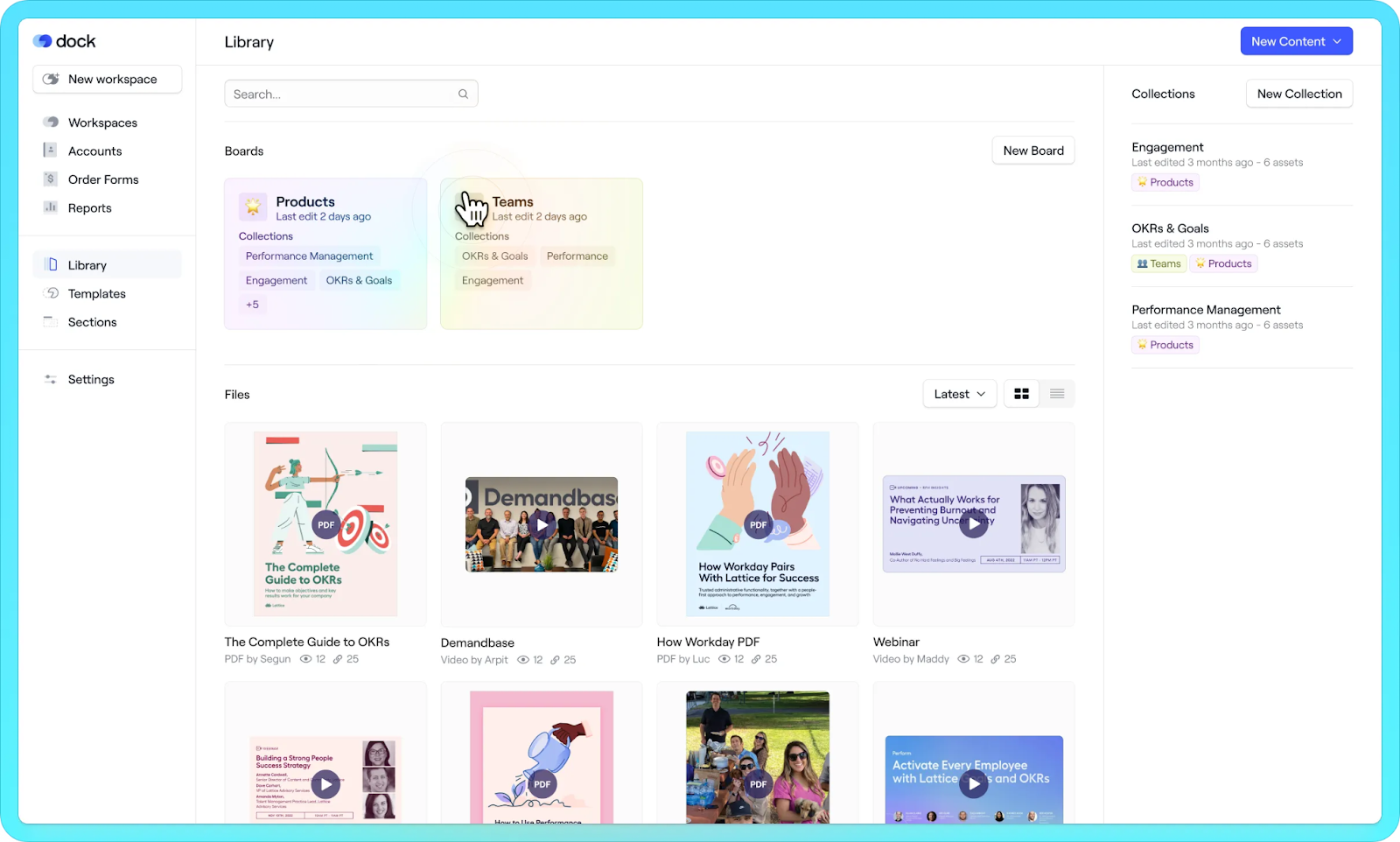
Dock is a digital sales room platform that gives sales teams and buyers a single, shared space to manage everything related to a deal (proposals, pricing, mutual action plans, etc.), from the first conversation to closing.
For sellers, Dock removes the friction of chasing down assets or guessing when to follow up. They can share content, track buyer engagement in real time, and manage approvals without leaving the workspace.
Buyers, on the other hand, get a clear, organized view of everything they need to make a decision, which helps keep deals moving and reduces last-minute stalls.
Key features in the Dock platform:
- Customizable templates – Standardize winning sales processes by creating workspace templates for different deal stages. Reps can spin up a personalized sales room in seconds, with pre-loaded assets, timelines, and action items.
- Content management – Keep sales and marketing materials organized and always up to date. Replace outdated assets without breaking links, and give reps a single, trackable link to share with buyers.
- Client portals – Deliver a premium, organized experience for customers with portals that handle onboarding, project management, file sharing, and renewals all in one place.
- Engagement tracking – See exactly when buyers view, download, or share content, so reps can time follow-ups and spot potential stalls before they happen.
- Integrations – Connect with Salesforce, HubSpot, Google Workspace, Microsoft tools, and more to make Dock an extension of your existing systems.
Why Dock is a good Seismic alternative
Seismic is built for large enterprises, comes with a steep learning curve, and carries an equally steep price tag—Vendr estimates an average annual cost of $31,950. And setting it up can take months and usually requires IT support.
Dock takes the opposite approach. It’s user-friendly, fast to set up, and affordable, with a free plan for up to 50 workspaces and paid plans starting at $4,200 per year for small to mid-sized businesses.
Also, while Seismic focuses almost exclusively on sales enablement, Dock caters to all customer-facing teams, including Customer Success and Marketing, making it a single platform for closing deals, managing content, and onboarding clients.
Dock is best for:
Revenue teams that need to collaborate directly with buyers, track deal progress in real time, and cut out the admin work that slows deals down.
Standout feature - Order Form Creation & Management
Dock replaces messy document templates and bulky CPQ (Configure, Price, Quote) systems with a fast, intuitive quote builder. Reps can create signable order forms in a few clicks, using a pre-defined product library, deal terms, and approval rules.
Standard legal documents can be pre-loaded into every deal, and buyers can sign directly in Dock via the built-in e-signature feature. This means faster turnarounds, fewer errors, and a smoother close for both sellers and buyers.
10. Trainual — Process documentation and onboarding at scale

Trainual is a platform for documenting your company’s processes, policies, and playbooks, then turning that knowledge into structured, searchable training. Trainual centralizes SOPs, templates, wikis, and knowledge bases in one place so employees can easily find answers and get up to speed faster.
For sales enablement, Trainual lets you build step-by-step training paths, role-specific onboarding checklists, and searchable process guides.
Its AI tools help you generate or refine content quickly, and the platform allows you to embed videos, PDFs, GIFs, and flowcharts from over 700 tools. That means you can create interactive, engaging sales materials without needing separate content systems.
Key features in the Trainual platform:
- Content editor and templates – Create and document processes, policies, and training materials from scratch using Trainual’s intuitive editor. If you don’t want to start from scratch, use one of 400+ industry-proven templates and customize them for your team.
- Onboarding and training – Build role-specific checklists and structured learning paths to guide new hires through onboarding and ensure they progress through training in the right order. Also, assign content based on responsibilities so every employee gets the training they need.
- Mobile and desktop access – Let employees access training anytime and learn on the go using Trainual’s apps for desktop, iOS, and Android.
- Chrome extension – Search and view Trainual content directly in your browser, or use the Capture tool to automatically document workflows and turn them into training materials without leaving your current task.
Why Trainual is a good Seismic alternative
Unlike Seismic, which costs over $30K annually, Trainual offers a far more affordable starting point, with plans beginning at $2,988/year. This makes it accessible to small businesses and growing teams.
Also, Trainual supports a broader range of teams than Seismic, including HR, operations, and customer service. Its library of 390+ pre-built compliance courses helps HR teams meet industry and legal requirements without creating content from scratch.
For companies seeking a single platform to document processes, train employees, and maintain compliance (without the steep enterprise setup, Trainual offers a practical, cost-effective alternative.
Trainual is best for:
Small to mid-sized businesses that need an affordable, centralized system for documenting processes, training employees, and maintaining compliance.
Standout feature - Delegation Planner
Trainual’s Delegation Planner helps managers visually map who’s responsible for what, how much time each task takes, and how it connects to training content. The drag-and-drop interface makes it easy to assign or reassign responsibilities, balance workloads, and ensure the right person owns every task.
When every responsibility is tied to the right training, work stays consistent, everyone knows what they’re accountable for, and the team runs smoothly with fewer gaps or mix-ups.
11. SalesHood — AI-powered enablement for faster, repeatable revenue

SalesHood is a sales enablement platform built to help teams onboard faster, master key skills, and activate content in ways that directly drive revenue. Instead of scattering training, coaching, and content across multiple tools, SalesHood unifies them into one platform where reps learn, practice, and execute in the same flow of work.
Its AI engine powers realistic roleplays and real-time feedback, and also helps managers connect training to performance outcomes, so you can see which skills and plays actually move deals forward.
Key features in the SalesHood platform:
- Content management – Organize sales content by role, sales motion, or campaign, and track it to know exactly which assets influence pipeline and revenue.
- Sales training and onboarding – Build repeatable onboarding and ongoing training programs with interactive lessons, pitch practice, and AI-driven feedback.
- Digital Sales Rooms – Create personalized buyer hubs with content recommendations, Mutual Action Plans, and AI-powered call notes.
- AI roleplays and feedback – Let reps practice realistic sales scenarios with AI personas, then receive instant feedback on tone, pacing, and messaging.
- Impact insights – Track team performance with leaderboards, heat maps, and AI-driven deal and content analytics.
Why SalesHood is a good Seismic alternative
Seismic’s content management system is efficient, but it can be complex and slow to set up. SalesHood, on the other hand, offers a more intuitive content organization system, with AI-powered content audits to keep sales materials fresh, and real-time pitch practice to help reps activate content effectively.
Its “Huddles” and “Paths” let you build full internal courses to train reps year-round, while Digital Sales Rooms and Mutual Action Plans fill Seismic’s gaps in buyer engagement and repeatable sales execution.
SalesHood is best for:
Agile sales teams that want faster onboarding, ongoing skills reinforcement, and built-in buyer engagement tools.
Standout feature - SKO (Sales Kickoff) AI
SalesHood’s AI-driven SKO solution helps plan, run, and measure impactful sales kickoffs. It combines AI-scored pitches, gamified learning, and MEDDICC-aligned workshops to align teams and drive in-quarter results.
The program also reinforces sales skills through micro-learning, deal reviews, and operational assessment. This ensures that the training from the kickoff translates into revenue.
12. Paperflite — Lightweight, AI-powered sales content management
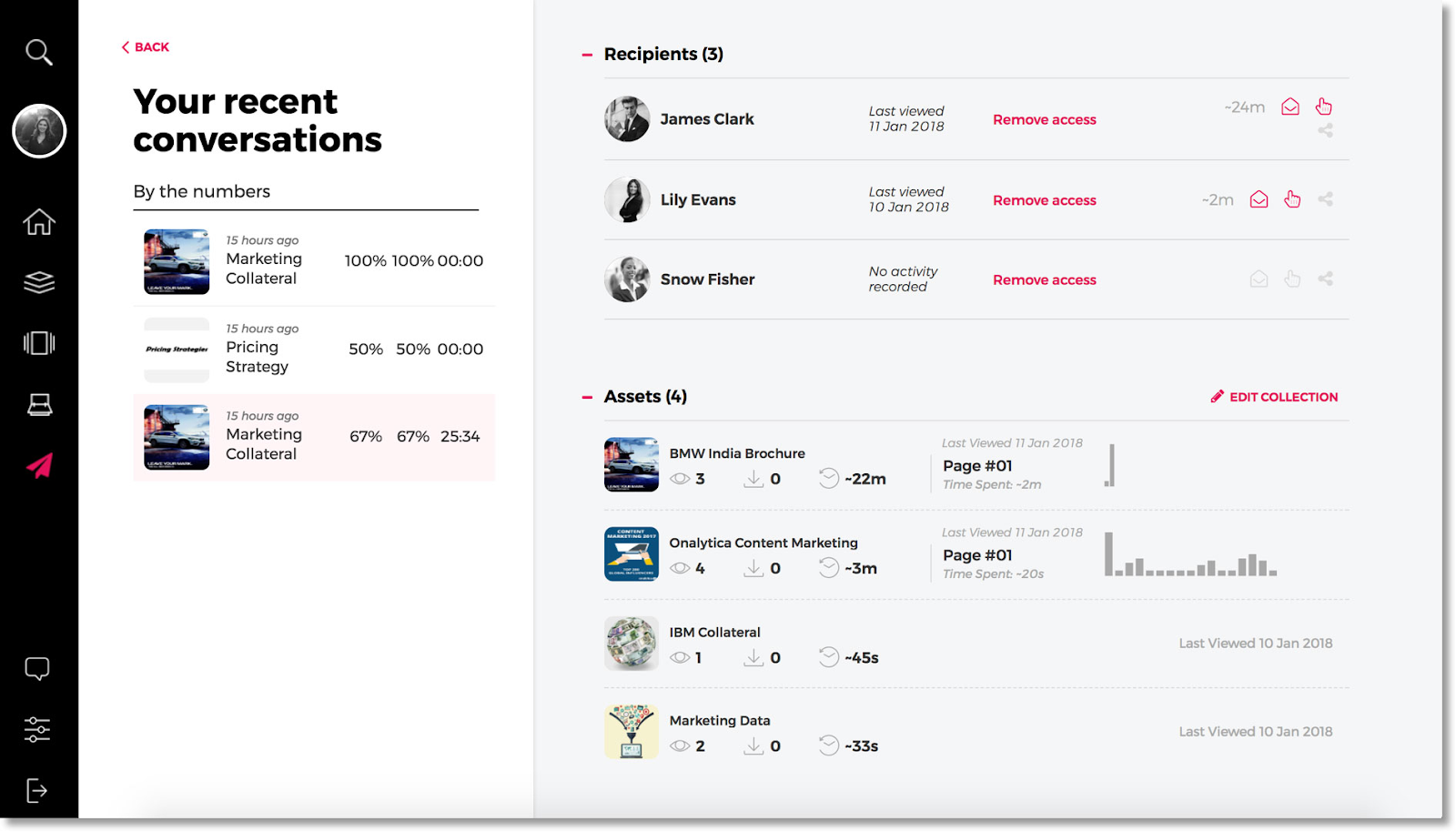
Paperflite is a sales enablement and content management platform that helps marketing and sales teams deliver the right content to prospects, then track exactly how it’s used.
Instead of bulky repositories or cluttered email attachments, Paperflite gives sellers a personalized content library, the ability to create personalized content hubs for clients (called microsites), and real-time engagement analytics.
By surfacing relevant assets for every stage of the sales cycle and showing how buyers interact with them, Paperflite makes it easier for sales and GTM teams to capture attention, influence decision-makers, and close deals faster.
Key features in the Paperflite platform:
- Content discovery – Organized content feeds and smart AI suggestions keep reps equipped with fresh, relevant materials. Highlight new assets, show what’s popular with teammates, and tailor each seller’s library to their needs.
- Smart filters – Paperflite’s proprietary SmartSearch algorithm combines the depth of Google search with the precision of Amazon-style filters, scanning 30+ indices (titles, tags, in-content text, etc.) to deliver exact-match content fast.
- Unified content library – Sync all content from platforms like SharePoint, Google Drive, and more into one searchable hub, and make in-platform edits to content templates without leaving Paperflite.
- Personalized microsites – Transform static attachments into visually rich, custom-branded content hubs for each buyer, complete with tailored messaging and imagery.
- Integrated content sharing – Share multiple assets directly from Gmail, Outlook, or Paperflite with built-in CTAs that guide buyers to engage.
Why Paperflite is a good Seismic alternative
Seismic’s ecosystem comprises many tools, making it powerful, but also complex, expensive, and slow to implement. Paperflite, on the other hand, is lightweight, easy to set up, and centers on three core areas: content management & sharing, analytics, and personalized microsites.
With plans starting at just $1,800/year for five users, Paperflite is accessible to small businesses and lean GTM teams without sacrificing functionality.
Paperflite is best for:
Sales and GTM teams that want a fast, affordable way to manage, share, and track content engagement with prospective buyers.
Standout feature — Content Intelligence
Paperflite’s Content Intelligence breaks down into three actionable areas:
- Content Discovery Intelligence – See what reps search for, what they share most, and how prospects respond, so you can spot gaps and improve resources.
- Content Engagement Intelligence – Get real-time insights into how buyers consume content, from page-by-page views to video watch time, to refine content strategy.
- Content Revenue Intelligence – Measure marketing’s direct impact on pipeline and revenue by tracking which content moves deals forward and generates leads.
13. Continu — Personalized training for teams and customers
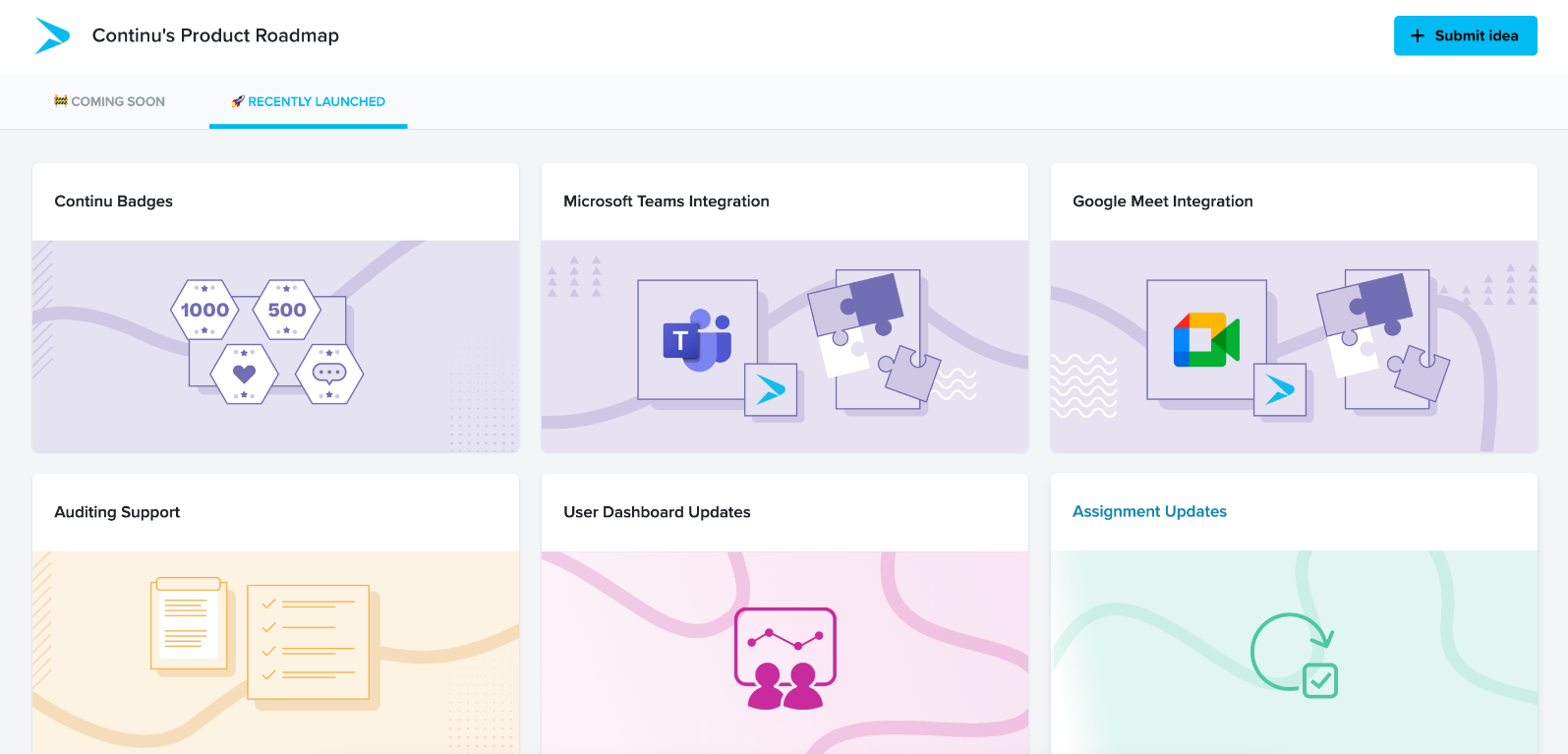
Continu is an AI-powered contextual learning platform built for mid-to-large organizations seeking to centralize all training (both internal and external) into one unified system.
This platform automates learning assignments based on key events like onboarding, role changes, or compliance deadlines. It also delivers role-specific, behavior-triggered content so each learner gets training tailored to their context.
To keep progress on track, Continu sends teams notifications in Slack, email, and Microsoft Teams, with manager escalation for overdue tasks. This way, employees, customers, and partners receive the right training at the right time.
Key features in the Continu platform:
- Content authoring – Create and customize training in minutes with an AI-powered drag-and-drop editor. Format content across articles, videos, SCORM files, PDFs, and images, and keep it dynamic with 700+ interactive embed options.
- Continu AI™ – Automates assignments, recommends content based on learner behavior and style, summarizes long sessions into bite-sized takeaways, and generates captions to improve accessibility.
- Smart Segmentation™ – Deliver the right training materials to the right people by using attributes like role, department, or location, and setting granular admin permissions. Then automate access so learners only see what’s relevant to them.
- Extend – Easily manage external learners by assigning seats, organizing user data, and controlling partner or customer access without the usual admin hassle.
Why Continu is a good Seismic alternative
Seismic is heavily focused on sales enablement, while Continu is designed for a broader scope, including employee training, onboarding, compliance training, customer training, partner enablement, and sales education.
It also comes with built-in content authoring tools, SCORM support, and deep customization options for branding, which makes it easier to create a cohesive learner experience across audiences.
Continuu is best for:
Organizations that want a single platform to train both internal teams (sales, HR, operations, etc.) and external stakeholders (customers, partners, resellers).
Standout feature – E-commerce
Continu lets you monetize your training content by creating subscription-based learning programs. You can package courses for partners, customers, or new audiences and sell them directly through the platform.
Flexible pricing and access controls let you serve beginners, advanced learners, or long-term clients with tailored learning paths. Built-in tools make it easy to collect and manage payments and renewals, so you can focus on delivering high-quality learning experiences.
14. Content Camel — Centralized sales & marketing content at your team’s fingertips
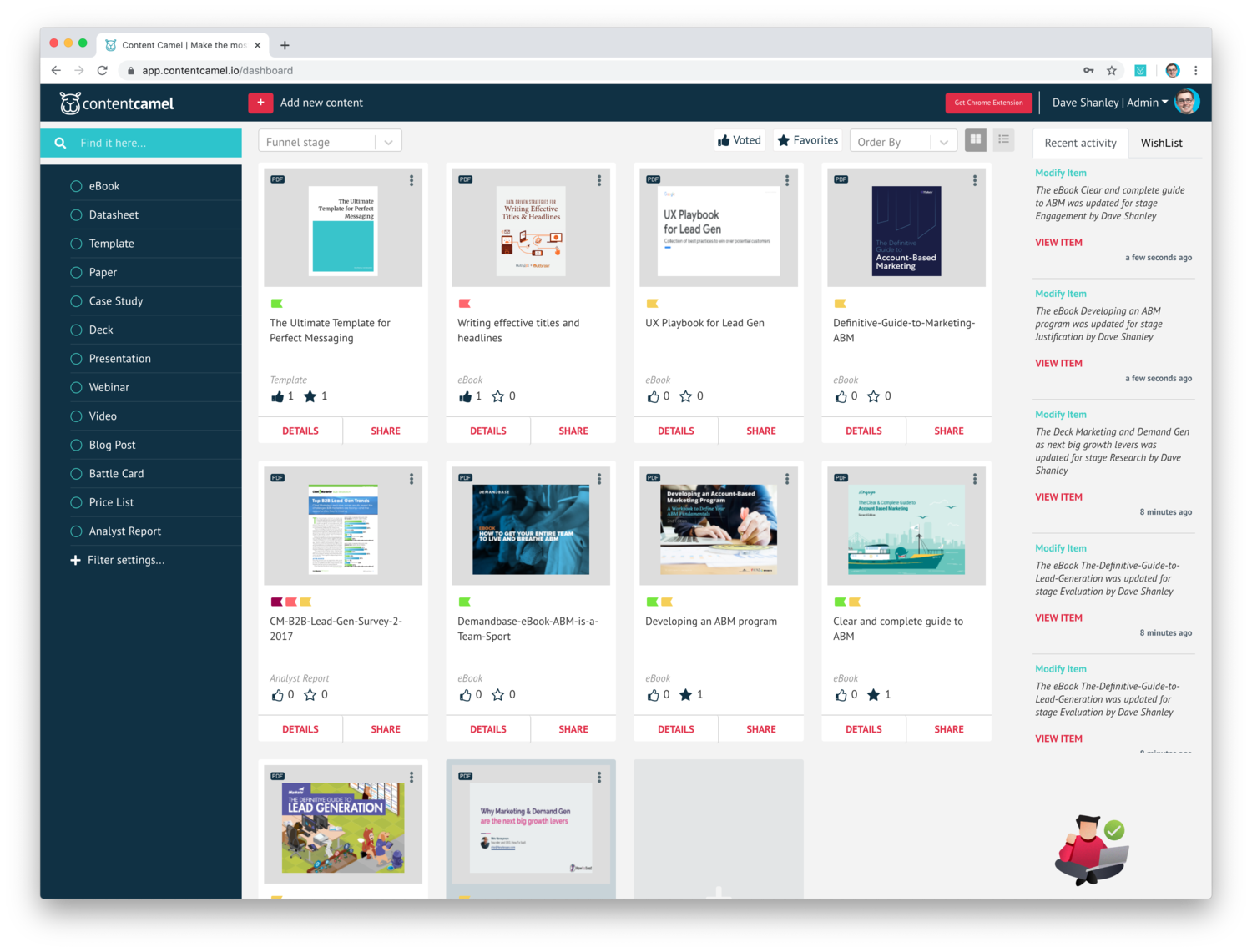
Content Camel is a sales enablement platform that centralizes all your marketing and sales collateral—whether it’s stored in Google Drive, SharePoint, Dropbox, or uploaded directly—into one searchable library.
It helps sales and marketing teams find the right asset quickly, share it with buyers in just a few clicks, and track exactly how prospects interact with it.
With built-in analytics, role-based permissions, and customizable buyer-facing pages, Content Camel helps teams keep every sales conversation relevant, on-brand, and driven by real engagement data.
Key features in the Content Camel platform
- Add online & offline content – Organize everything from PDFs and spreadsheets to blog posts and industry articles. Bulk import content from Google Drive, URLs, or direct upload, and map each asset to funnel stages and content types for easy discovery.
- Content discovery – Sellers can instantly find the right asset by filtering by funnel stage, asset type, or tag to see what’s fresh, what’s trending, and which content drives the most engagement.
- User roles – Give marketers, sales enablement teams, and reps different permissions, so branding stays consistent while sellers still have freedom to create personalized content pages.
- Chrome extension – Pull the right sales/marketing content into Gmail, Salesforce, Drift, Salesloft, and more without leaving your workflow. Then filter by favorites or see what’s been voted up by teammates.
- Content analytics – Every asset has its own smart shortlink for real-time engagement tracking. See which content performs best by type and funnel stage, and spot what needs refreshing.
Why Content Camel is a good Seismic alternative
While Seismic is built for large enterprises (with an expensive price tag to match), Content Camel is built for small to mid-sized teams that want fast onboarding, a leaner setup, and a price point that suits a tighter budget.
It delivers centralized sales plays, marketing–sales feedback loops, and customizable buyer experiences, without the overhead of large ecosystems like Seismic.
Plus, with a free forever plan for solo sellers/marketers and paid plans starting at just $15/user/month (up to 250 users), Content Camel is accessible for growing teams.
Content Camel is best for:
Marketing, sales, and product teams who need an affordable and user-friendly tool to organize, share, and track sales content.
Standout feature – Brand Consistency Tools
Content Camel lets you create branded content pages, set custom URLs, use your own domain for all assets, and apply your brand colors and logo to every content experience page. This ensures that every asset looks polished, professional, and aligned with your brand identity.
Choosing the right Seismic alternative
The best Seismic alternative depends on your team’s size, budget, and focus.
If you’re a small business with a limited budget, Trainual gives you affordable process documentation and compliance training. For customer-facing teams outside of sales (like marketing or customer support), Content Camel keeps training content simple and organized, while Bigtincan equips retail and frontline reps who are always on the move.
If you want to train employees and also sell learning programs to customers and partners, Continu is built for that. And for companies building robust certifications or in-depth learning paths, WorkRamp and Mindtickle offer the flexibility and structure to scale.
But here’s the problem with all of them: sales content and training don’t stick unless they’re reinforced in the moment of need. And that’s exactly what makes Spekit the most powerful Seismic alternative.
Instead of relying on reps to dig through content repositories or remember an LMS module, Spekit uses AI to proactively surface answers, playbooks, and guidance right where work happens, in Salesforce, Slack, Gmail, HubSpot, Gong, and more. Our Chrome extension extends that reach, embedding contextual answers and resources into any workflow so learning feels natural, not forced.
With Spekit, enablement finally becomes always-on, contextual, and effortless to adopt. Updates sync instantly, adoption skyrockets, and every rep gets the right knowledge at the right time to move deals forward faster.
If you’re ready to leave behind clunky, hard-to-maintain platforms, book a demo with Spekit today and see how just-in-time enablement can transform your team’s productivity, adoption, and revenue impact.

